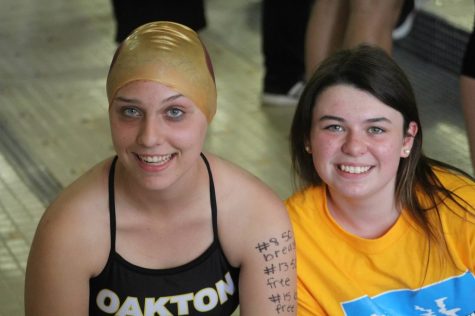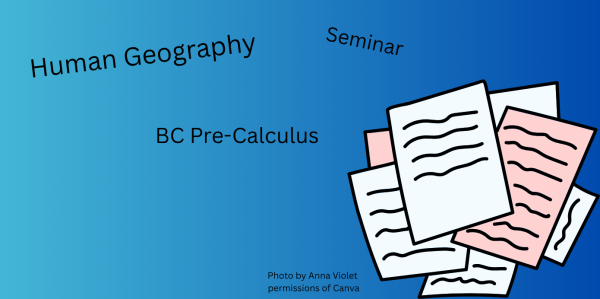AP European History and Shakespeare Studies: to take or not to take
Two new classes are being added to the course selection for next year
This year at the Curriculum Fair, Oakton introduced two new courses that will be available for the first time next year. Starting in next week, students will be able to enroll in AP European History and Shakespeare Studies for next school year.
AP European History is the third AP history course available to high school students. Along with AP World History (AP World) and AP United States History (APUSH), AP Euro allows students to develop historical thinking skills. The course is separated into four time periods, and the curriculum starts around 1450 in the Middle Ages and goes up to present day. At Oakton, the class will be available to juniors and seniors next year, where it will most likely be taught by Mr. William Tiller, an AP Government teacher.
AP Euro is similar to AP World and APUSH in curriculum with more focus on Europe than the others. Even though AP Euro is another AP history class, it can only be taken as an elective, as it does not replace a normal history course in the sequence. Its “potpourri of subjects” follows five common themes. These themes are Interaction of Europe and the World, Poverty and Prosperity, Objective Knowledge and Subjective Vision, States and Other Institutions of Power, and Individual and Society.
After briefly describing the class, Mr. Tiller explained how he is going to teach the class next year. One of the most important points he made was that the class would be based on the five themes mentioned above rather than memorization of specific details and events. He also said that students will learn to draw parallels and see how certain events impact others in history, such as the American Revolution impacting the French Revolution. Another interesting aspect AP Euro has to offer is that students will be looking at documents from that time period, one of which is Winston Churchill’s speech.
The first few sessions had a relatively high turnout, with over 30 students listening to the presentation. By the fourth session, the attendance had dwindled down to 20 students.
Mr. Tiller stressed that people should join the class if they like “to debate, to write, and enjoy the subject matter.” He said that it’s upsetting to see wallflowers in his classes because they genuinely aren’t interested in what the class is studying or the activity they are doing. As a senior, you “can have Mr. Tiller twice.. How cool is that?”
In all, AP European History is a great class for filling an extra elective spot if you’re interested in learning more about Europe’s history and its impact on the rest of the world.
Shakespeare Studies is another new class that will be introduced to Oakton for the first time in September. Since the class is so new, the curriculum isn’t set, and there are not going to be any tests or busy work. Ms. Margaret Moran, a current English teacher, explained that because of this, there will be many choices for the students’ learning and creative assessments. Ms. Moran also said there wouldn’t be research projects and taking notes; it would be more revolved around participation and experimentation.
Shakespeare Studies is an elective, so it should relieve stress of students, in addition to (mainly) not having homework. Shakespeare Studies is also a critical reading class and helps in English, as each grade reads a different work from Shakespeare.
The majority of the class is being graded on quarterly projects and participation for reading short excerpts of the “bloodiest, saddest, most intense scenes” from Shakespeare. However, Ms. Moran plans to read six plays to its entirety, including comedies, histories, and tragedies.
However, most people wanted to know how they would be able to read Shakespeare, as it’s known for it’s difficulty. Ms. Moran said that students would be working on short excerpts, in addition to the reenactments and projects, rather than full plays, so she could help walk the students through the difficult language. “If you like the content, let me take care of the language,” said Ms. Moran.
To go along with the relaxed feel of the curriculum, the classroom is not set in a typical classroom setting. For the Curriculum Fair, the room was set with chairs on the edge of the classroom in a circle around the SMART Board and the desks were pushed to one side of the classroom. She said, “If you’re sitting at a desk doing Shakespeare, you’re doing it wrong.” Ms. Moran wants the students to not think of the “dusty, old Shakespeare with the white collar;” she wants them to think of the intensity of his plays, which she showed in a video trailer for a TV show called Will, which is about Shakespeare.
At the Curriculum Fair, Shakespeare Studies was another popular class, like AP Euro. The first session had every chair full, but quickly descended to roughly 15 students in the second session and 13 interested students in the third session.
Both AP European History and Shakespeare Studies had a lot of student interest at the Curriculum Fair. If you were not able to see either class, the presentations Mr. Tiller and Ms. Moran presented will be shown below.
*Note: The story will be updated with the Shakespeare Studies presentation when the pictures are approved to be used in this story.

As a veteran of the Oakton Outlook, Jennifer (right) has seen the paper and her skills evolve since the beginning of her time as a member of the staff....





